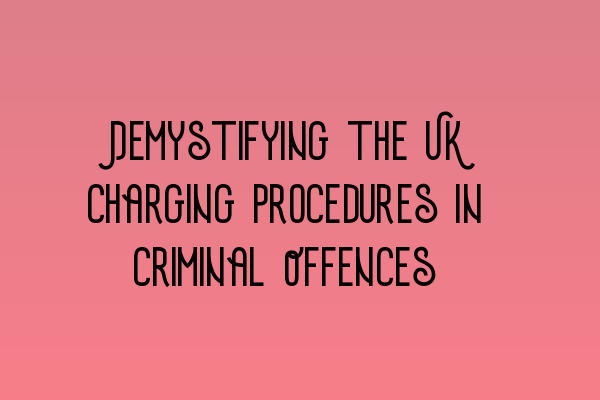Demystifying the UK Charging Procedures in Criminal Offences
As criminal law solicitors at SQE Criminal Law & Practice Law UK, we understand how confusing and overwhelming the charging procedures can be for individuals involved in criminal offences. In this blog post, we aim to demystify the UK charging procedures, providing you with a clear understanding of the process.
What is a Charging Procedure?
A charging procedure is a crucial step in the criminal justice system, where the police or other investigating agencies formally accuse an individual of committing a criminal offence. This formal accusation will lead to the initiation of court proceedings and potential prosecution.
Before charges can be brought against an individual, the investigating authorities must gather sufficient evidence to establish a prima facie case. The evidence will be evaluated based on the standard of proof required, which is “beyond reasonable doubt” in criminal cases.
The Charging Process
The charging process typically involves the following steps:
- Investigation: The police or other relevant authorities will carry out an investigation to gather evidence and determine whether there are sufficient grounds to suspect an individual of committing a crime.
- Arrest: If the investigating authorities believe they have enough evidence, they may arrest the individual. However, it’s important to note that an arrest does not amount to a formal charge.
- Interview: Once an individual is arrested, they may be interviewed by the police to gather additional evidence and obtain their account of the events.
- Evaluation: After the investigation and interview, the police or investigating agencies will evaluate the gathered evidence to determine whether there is enough to charge the individual.
- Charge: If the investigating agencies believe there is enough evidence, they will charge the individual. This means that the individual will be formally informed of the criminal charges against them.
Types of Charges
In the UK, criminal offences can be categorized into three main types of charges:
- Summary Only Offenses: These are less serious offences that can only be dealt with by a Magistrates’ Court. Examples include minor assaults and traffic offenses.
- Either Way Offenses: These are intermediate-level offences that can be dealt with by either a Magistrates’ Court or a Crown Court, depending on the seriousness. This category includes offenses such as theft and some drug-related offenses.
- Indictable Offenses: These are the most serious criminal offences, such as murder and rape, which can only be dealt with by a Crown Court.
Next Steps After Being Charged
Once an individual has been charged with a criminal offence, they will need legal representation to navigate through the court proceedings effectively. At SQE Criminal Law & Practice Law UK, our expert solicitors have extensive experience in providing legal assistance to individuals at every stage of the criminal justice process.
If you or someone you know has been charged with a criminal offence, it is crucial to seek legal advice as soon as possible. Our highly skilled and dedicated solicitors can help you understand the charges, evaluate your options, and build a strong defense strategy tailored to your specific case.
For more information about SQE 1 Practice Exam Questions, SQE 1 Practice Mocks FLK1 FLK2, SQE 2 Preparation Courses, SQE 1 Preparation Courses, and SRA SQE Exam Dates, please click on the respective links.
Demystifying the UK charging procedures in criminal offences is essential to ensure individuals have a fair chance in the criminal justice system. At SQE Criminal Law & Practice Law UK, we are committed to providing dedicated legal representation and support to our clients throughout the entire process.
